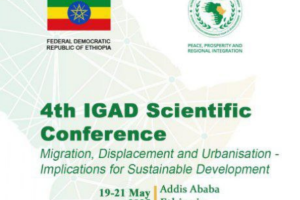BY YOHANES JEMANEH
The government along with partners has been exerting efforts to restore Tigray and humanitarian assistance is being provided to those who are affected during the law enforcement operation in the state. Recently, the Ministry of Foreign Affairs hosted a high-level consultative meeting with government agencies, stakeholders and humanitarian partners about the overall humanitarian, peace and security issues in Tigray State.
The occasion that was chaired by Deputy Prime Minister and Foreign Affairs Minister Demeke Mekonnen was an important platform in which the diplomats were updated about the progress and the challenges observed in Tigray following the law enforcement operation in the state.
Repudiating the humanitarian progress achieved so far by sticking to unfounded claims is morally, politically, and legally unacceptable despite all challenges that remain to be solved in many intervention areas in the state, the minister said.
With regard to the humanitarian assistance that has been provided in Tigray State, Peace Minister Mufarihat Kamil said that the government has addressed the humanitarian needs of 4.5 million people in the first round of aid while a total of 4.9 million people were reached in the second and third round.
She also stated that the efforts to address 1.9 million Internally Displaced Peoples (IDPs) in the region are well expanded highlighting that the government has taken the initiative to facilitate dialogue with the Amhara and Tigray regional states to resettle IDPs that were displaced from Western Tigray. Aside from establishing centers for mobile health services, the minister said 46.5 percent of the health centers in the state have become functional.
According to Muferihat, some schools have been temporarily occupied by IDPs where the government is working to relocate them to better areas. And some of the recent concerns on using schools for military purposes were a far cry from the truth. The government is also providing seeds and farming equipment to farmers, where 70 percent of the land has been made ready for cultivation involving 1.2 million farmers in the state, she noted.
Speaking about the rehabilitation and reconstruction of destroyed infrastructures and disrupted public services, Muferihat said, some factories in the region, including textile and cement factories have already started operation. Reiterating the government’s policy of zero tolerance to human rights abuses and appreciating the joint EHRC-UN investigations, she said
the military, the federal and regional justice systems are working in concert, where 60 suspected soldiers were brought to justice, of whom some are convicted and sentenced subsequently.
The uncorroborated reports that misrepresented the facts on the ground and misunderstandings of humanitarian partners on the security concerns of military personnel at some checkpoints as facts for denial of access to the state are among the challenges affecting the restoration efforts.
Defence Minister Kenea Yadeta on his part expressed that the process of withdrawing Eritrean troops has already begun. Despite the media propaganda, he said TPLF is not in a position to fight the Ethiopian Defense Forces although it sparks sporadic clashes at very few pocket areas.
Sharing Kenea’s assumption, General Almeshet Degefe, said the terrorist group has tried to impede access to humanitarian support envisaging famine in the areas as a political strategy to garner support from aggrieved people by causing troubles in some pocket areas, such as the West of Maichew, Gura, and Temben.
The Ethiopian Defense Forces are well known for taking military discipline very seriously as witnessed in serving in various UN peacekeeping missions, he said adding that there is no reason for our soldiers to go wild as they are lenient when it comes to protecting the well-being of our own people in Tigray.
Information Network Security Agency Director General Shumete Gizaw explained the types of communication tools that are allowed to be in the hands of civilians and stressed that quests by the humanitarian agencies to possess gadgets that should only be restricted to military personnel are not acceptable.
He said quests to possess communication equipment shall be entertained if the equipment is in alignment with the mission of the aid agency, does not compromise national security and can make services more efficient. He also questions why the government has been reluctant to announce the misuse of privileges by some aid agencies that were caught while attempting to transport ammunition to the terrorist group and unduly repressing and firing Ethiopian staffers in the organizations, it was learned.
Tigray State Provisional Administration Head Abraham Belay (PhD) doesn’t try to hide his confusion about the motives of reports that denied the reality on the ground. He affirmed that the issue of access to humanitarian support in the region except in some pocket areas has been granted. He said the federal and regional governments have been using their scarce resources to rebuild most of the infrastructures and public services, such as telecommunication, electricity, banking, and financial services that were destroyed by TPLF.
“What we need now is material and financial support. Many IDPs in the region need to go back home equipped with basic facilities,” he said. The meeting also discussed the possibilities of opening Shire and Humera Airports, including the modalities required to extend visas granted to aid agencies, it was indicated.
Despite the accusations and strong influence on the government about humanitarian assistance, the international organizations and countries have improved their support. It was learnt that only 33 percent of the nonfood assistance in Tigray is covered by partners. It is the government that has been covering the lion’s share of the aids that reached to citizens in 93 woredas. Humanitarian support has been provided in the State since the completion of the law enforcement operation, according to the National Disaster Risk Management Commissioner Mitiku Kassa. He said six partners have participated in the third round support. These are World Food Program, World Vision, Care International, Tigray Rehabilitation Organization and Food for Hungry.
As to him, the government has been endeavoring to facilitate conditions to create a conducive environment for uninterrupted humanitarian access in the area. This is a clear manifestation of the commitment of the government to work together with humanitarian partners. Currently, some 5.2 million people in Tigray need humanitarian assistance. There are also one million and ten thousands safety net beneficiaries and 436,000 Eritrean refugees in Tigray. Therefore, concerted effort is a must to reach out to those people who are in need of humanitarian support. In this regard, international partners are expected to show strong commitment and keen interest to increase support instead of accusing the government of not discharging responsibilities merely singling out minor gaps through media. Not only is access to humanitarian assistance needed, cooperation is also essential this time to restore infrastructural facilities and back the state to normalcy shortly.
In his closing speech, Demeke said the government will facilitate similar consultative platforms in the near future. It is committed to returning the state to normalcy by making an all-inclusive dialogue with stakeholders. Ambassadors of donor countries, UN representatives, humanitarian partners, and government officials including Peace Minister Muferihat Kamil, Defense Minister Kenea Yadeta, Tigray State Provisional Administration Head Abraham Belay (Ph.D.), Information Network Security Agency Director General Shumete Gizaw (Ph.D.), National Disaster Risk Management Commissioner Mitiku Kassa, and General Alemeshet Degefe participated in the meeting, the information from the Official Facebook Page of the Ministry of Foreign Affairs indicated.
The Ethiopian Herald June 16/2021




